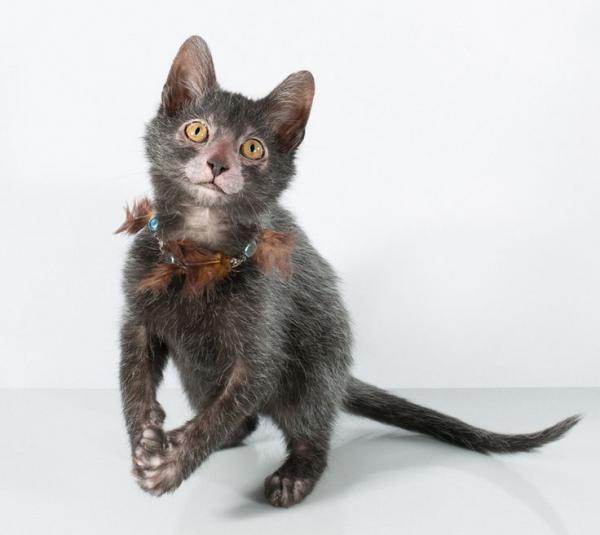Lykoi or Cat Wolf: Breed Personality, Behavior Facts and Characteristics, Health Care Info

If you have heard or seen a cat lykoi I’m sure you’ve been surprised, because his appearance reminds us of a wolf and, therefore, does not leave anyone indifferent. It is one of the newest breeds of domestic felines and, in fact, is still in the process of being fully admitted as a breed, as there are still few specimens worldwide. This feline is rapidly gaining popularity, especially in North America, which is the place where it has emerged and, therefore, where it is best known at the moment.
Keep reading this tab to know Everything you need to know about the lykoi or cat wolf, a race of incredible appearance and character that begins its history in the United States.
Origin of the lykoi cat
The cat lykoi began to be seen in the year 2010, in two litters unrelated, with little time difference and one born in Virginia and the other in Tennessee. Thus, the origin of this feline race is in the USA. The appearance of this race was given by a natural mutation of the short-haired domestic cat. Although throughout the last 20 years have been seen some kittens with some differentiated feature, they did not come to seem of any other race than the common short hair until the first appeared completely different and began to breed to become this another race.
Although the mother was a common black cat, the little ones were born with this strange fur and with some hairless parts and, for this reason, it was believed that they could have a genetic relationship with the sphynx or sphinx cats. Veterinary and genetic studies were carried out in American universities, since the owners were worried about whether they had a health problem and, therefore, it was ruled out that it was due to some disease and the relationship with the sphynx was also denied. A) Yes, they have no genetic relationship with hairless cats nor other similar ones like devon rex.
On the other hand, it is interesting the name that was given to these new felines, because based on their appearance the word was chosen “Lykoi” meaning “wolf” in Greek. Indeed, although they are not related to wolves anywhere, their fur and eyes remind us of these animals.
Currently, at the moment, there are only few dozens of wolf cats around the planet. In order to establish a consolidated breed, the breeders count on the help of the University of Tennessee to avoid the appearance of diseases and genetic problems.
Physical characteristics of the wolf cat
Physically, as you can see in the images of the lykoi cat that you will find at the end of this file, they are a race with a stylized body, a very peculiar coat and yellow eyes that, together, give him the wolf aspect that gave them their name.
They are normal size domestic cats, since they weigh between 3,5 and 7 kg, with males being larger than females. The shape of the head is a little triangular, its eyes are big and yellow, color that intensifies when they grow, and their nose is always black.
The fur is short and roan color, that is, they are black or gray base color and have white hairs and tufts, giving them a mixed and messy mantle appearance. In addition, the type of hair is soft although it has a hard or rough appearance.
A curious fact is that when they are born they have very little hair or none in its snout, the outline of its eyes, the belly, the ears and, sometimes, also in the legs. The most usual is that as they grow their fur increases and ends up covering all these parts, although it is lighter in some, but there are adult specimens that have continued with the face and belly quite clear.
Character of the lykoi
Although its appearance may seem somewhat fierce, and may even give some respect to some, the wolf cat has the normal character of any other domestic feline. Therefore, people who have already lived with some of them, they are described as very affectionate, sweet, friendly, playful, cheerful, very intelligent, somewhat naughty and quite active. In addition, they have a marked hunter instinct and are somewhat distrustful of those who do not know yet, although they take a short time to approach and let themselves be known. In fact, they have reached compare them with dogs as for his character.
These felines are like that as long as they have been accustomed from small to live with people and more pets, which has been done so far because there are so few copies.
Cat care lykoi
The care of your coat requires a normal brushing, because being short hair will suffice two weekly brushes and newspapers in the molting season. As cats clean themselves, in principle, it is not necessary to bathe them and we avoid damaging the natural protection layer of their skin. It is only advisable to clean it when the animal gets very dirty and, in this case, it is advisable to use dry cleaning shampoos or cloths or wet wipes. If we use a shampoo to wash it with water it should be special for cats and never for humans or other animals.
If you want to the feeding of this feline breed It has to be of quality because, otherwise, we will begin to see health problems due to the lack of necessary nutrients. It is important that we adapt your diet to your age, physical activity and your state of health. In addition to the commercial feed, you can also get some homemade wet food every day, something healthy and you will love it.
Also, as with any other domestic cat, we must observe that their ears, eyes, nails and mouth are clean and do not show any damage. But, we may need to clean your eyes, teeth and ears sometime and also trim your nails, especially if one breaks.
Wolf cat health
For the moment, as it has been proven in its short existence, it is believed that its life expectancy is like that of a common cat, so it is estimated that it can reach the 20 years of life.
So far, no specific diseases or conditions of this race have been detected and no tendency to a specific health problem has been found, but it has been shown that Your health is excellent. Thus, the problems they may have are those that affect any other domestic cat, that is, they may suffer from some of the most common diseases in cats.
Thus, to prevent any disease or illness it is vital that the vaccination schedule for cats is followed and that external and internal deworming is also complied with, whether the animal spends all of its time at home or leaves the home. Finally, to take good care of your health, we advise you go to the vet every 6 or 12 months and, so, make sure everything is going well.


